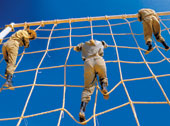 |
| LADDER TO THE SKY: Managers are benefiting from the rigours of military exercise |
In September, 40 executives from Citigroup’s global wealth management group travelled to West Point to participate in a leadership reaction course, a series of rigorous physical and mental exercises usually reserved for cadets. The goal was to enhance the leadership skills of some of Citigroup’s most promising executives by having them work together to overcome physical and psychological challenges.
One exercise required teammates to imagine they were trapped in a prisoner of war (P..W) camp with an expanse of water before them. To escape, the team was given a piece of pipe, a rope and a ladder not quite long enough to reach across the water. One participant, Susan Thomson, said the experience enabled her and her colleagues to step out of their usual corporate roles and think more creatively about problem solving. “It was fascinating to see leaders emerge depending upon the task ? both thought leaders and physical leaders,” said Thomson, who works in New York as managing director of corporate affairs for the group.
Certain parts of the staging areas were painted red to indicate they were off limits to participants, and team-members repeatedly warned each other to “look out for the red”, Thomson said. At Citigroup, the phrase has become a metaphor for helping each other. Such exercises are increasingly being used to help companies turn high-potential employees into next-generation leaders. In a March 2005 survey of chief executives by the Ken Blanchard Companies, 58 percent said that developing potential leaders was their most pressing concern; 61 percent said that developing managerial and supervisory skills was a major concern.
Michael Useem, a management professor at the Wharton School of the University of Pennsylvania and director of its Centre for Leadership and Change Management, helped organise the Citigroup trip and orchestrates others for mid-career professionals. “More and more, I get calls from companies interested in developing their leadership, saying their hard-charging executives are good in the classroom, but need to be engaged in other ways,” he said.
These types of learning adventures, however, are more than fun and games. They usually entail a comprehensive follow-up, where participants analyse what happened and draw lessons that can be used in the corporate world.
Daniel Holden, president of Daniel Holden & Associates, a leadership and organisational development consulting firm in Hartford, said experiential learning was powerful because it went beyond intellectual sessions. “Much of executive and leadership development at companies or in MBA programmes is done in the classroom and emphasises only cognitive learning,” he said. “This goes much deeper, exposing participants to their own fears, doubts, concerns, hopes and values in a way that a book or a seminar doesn’t.”
In such a programme, Keith Myricks, national account manager for DaimlerChrysler Services North America, the company’s financial services group, learned about the leadership style of Gen. Joshua Lawrence Chamberlain, who took 250 mutinous men and quickly turned them into Union soldiers ready for battle. “He could have shot them if he wanted, but the first thing he asked when these men were brought to him was, ‘When was the last time you had something to eat?’”, Myricks said. “And it solidified my own thinking ? if you treat people like employees, that’s what you get: employees. But if you get their input on decisions, you get a productive team.”
Each year, the leadership at Sapient, a technology consulting firm in Cambridge, Massachusetts, invites senior executives it considers rising stars to go on a diving trip to Bermuda. Dennis Reina, a principal in the leadership consulting firm Chagnon & Reina, says that learning this way gives participants “a shared experience, a visceral memory that they can draw upon in situations where it’s needed.”
Seasoned managers are not the only ones seeking adventure-based learning; it is now offered at several top business schools as well.
The Wharton School began offering leadership trips to Antarctica in January 2004. Andras Forgacs participated in the Antarctica trip in January 2004 and said it was his pivotal learning experience in business school. He and 17 classmates applied concepts like strategic thinking and persuasive communication to situations in Antarctica. Three teams of six worked together to take down and set up camp, which included building a snow wall to protect tents from the wind. Forgacs said the experience distilled for him the importance of relating to people.
“In a job you can get by with not always being responsive,” he said. “But in Antarctica, your effect on the group is more concrete. In class, we talk about effective teams and leadership, but it sounds like a pep talk. In an environment like Antarctica, you see the teams that get water boiling, make supper, get their tents up and down faster are more comfortable than teams that can’t rely as well on one another. The words ‘effective team’ really mean something.”
?NYTNS










